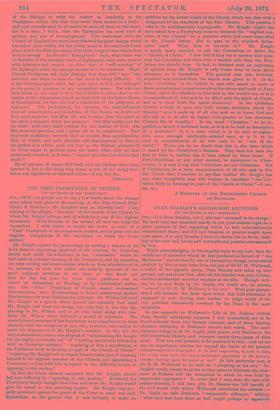THE FREE PRESBYTERY OF DUNDEE.
[TO THE EDITOR OF THE HPSOTATOR.1
Srn,—Will you permit me to say a few words about the strange scene which took place at the meeting of the Free-Church Pres- bytery of Dundee in Mr. Knight's case on Monday last ? I say nothing of the alleged "freeness" of the branch of the Church to which Mr. Knight belongs, and of which he is one of the highest ornaments. Of its freeness or the reverse all men can judge for themselves. I wish rather to notice the modus operandi of a "Free" Presbytery of the nineteenth century, and to point out the singular unhappiness of the conclusion at which the Court arrived.
Mr. Knight opened the proceedings by reading a minute of his Kirk Session, expressing approval of his conduct, by declaring firmly and nobly his adherence to the " statement " which he had made at a former meeting of the Presbytery, and by repeating the very cutting and severe rebuke which he then administered to his accusers, as men who either are entirely ignorant Of the great religious problems of our time, or who know not that the day has gone by when these problems can be solved by dogmatism in theology or by ecclesiastical autho- rity. The " Free " Presbytery of Dundee cannot understand Protestantism, when Protestantism is found reasserting against Presbyterians Its most fundamental principle. Dr. Wilson followed Mr. Knight in a speech which proved not certainly that what Mr. Knight had done was wrong, but only that it was very dis- pleasing to Dr. Wilson, and to all who think along with him. After Dr. Wilson there followed a crowd of followers. The more Liberal members of the Presbytery were conspicuous by their absence, with the exception of one, who, however, was careful to mark his disapproval of Mr. Knight's conduct. In the end the very extraordinary course was adopted of "admonishing Mr. Knight for the highly censurable act" of "holding ministerial fellowship with an Unitarian minister," "requiring of him a repudiation of the Unitarian body as forming no part of the Church of Christ," "enjoining Mr. Knight not to repeat the act under pain of exposing himself to the highest censures of the Church, and appointing a Committee to deal with him in regard to the difficulty he has in agreeing to this motion."
At first the Court seemed surprised that Mr. Knight should feel any difficulty in "agreeing to this motion." Evidently the Presbytery calmly thought that then and there Mr. Knight would give his assent to this startling request. Mr. Knight very pro- perly protested against the power of the Court to exact any such declaration, on the ground that it was virtually to make an addition by the lowest Court of the Church which can deal with a clergyman td the standards of the Free Church. This position I take to be ecclesiastically impregnable. Mr. Knight might also have asked how a Presbytery came to threaten the "highest cen- sures of the Church" on a question which had never been tried in the Church before. But to pass to the required declar- ation itself. What does it amount to ? Mr. Knight is surely fairly entitled to ask the Committee to define the "Church of Christ." I fear that if they try to answer that ques- tion the Committee will show even a weaker side than the Pres- bytery has already done. In fact, to demand such an expression of opinion from Mr. Knight is only worse than to have given utterance to it themselves. The general case has, however, acquired new interest from the aspect now given to it. Is the term " Christian" to be limited to men who assent to more or fewer metaphysical propositions about the nature and work of Jesus Christ, about the relations to God and to the world's sin, or is it. to comprehend all who seek to be filled with the spirit of Christ, and so to show forth the moral character? Is the Christian Church a body of men who hold certain doctrines about the Sonship ? or is it made up of all who seek so to know God and His will as to be able to repeat, with greater or less closeness, Christ's life of Sonship ? Is the word " Christian " to be re- garded as merely a technical term, or is it to be held as descriptive of a character? Is it a term which is to be used as separa- tive, even amongst spiritually-minded men, or is it to be used as comprehensive of all who seek to be "not of the world" ? There can be no doubt that this is the issue which is raised by the Presbytery's decision. They have not been the first to raise it, neither has it been raised by them alone. If Free-Churchism, or any other sectism, be equivalent to Chris- tianity, it is easy to say that Unitarians are not Christians. But if Christianity be a term comprehensive of all who seek to live like Christ, then I venture to say that neither Mr. Knight nor any other thoughtful man will venture to repudiate "the Uni- tarian body as forming no part of the Church of Christ."—I am, Sir, &c.,
A MINISTER OF THE ESTABLISHED CHURCH ox Scomarrn.


































 Previous page
Previous page